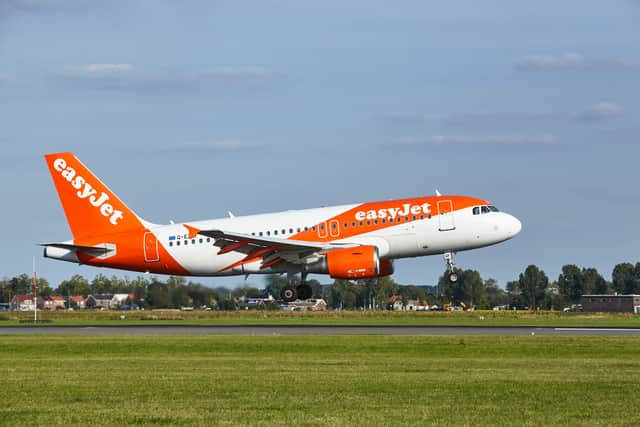EasyJet extends Covid voucher validity for holidays disrupted by pandemic
and live on Freeview channel 276
EasyJet has extended the deadline to book flights with Covid vouchers that were issued for holidays disrupted by the pandemic.
The budget airline has announced that passengers now have an extra six months to use the vouchers to book flights. The vouchers were originally due to expire on 31 July this year, but holidaymakers now have until 31 January 2024 to use the vouchers on flights and holidays.
Advertisement
Hide AdAdvertisement
Hide AdThe vouchers were issued instead of refunds for cancelled or delayed flights during the pandemic when Covid travel restrictions prevented thousands from heading on holidays abroad.


The extension will be applied to vouchers automatically, so passengers who still have some to spend don’t need to do anything to qualify for the new date. EasyJet has confirmed it would inform customers of the date changes via email.
Holidaymakers don’t need to squeeze in a holiday before 31 January to use the voucher - it simply means that flights need to have been booked by or on this date. The voucher can only be used on easyJet flights and cannot be redeemed against an easyJet package holiday.
In September 2022, the airline said there was still £111 million in vouchers still yet to be redeemed by holidaymakers, but it is unclear how many individual customers are affected.
Advertisement
Hide AdAdvertisement
Hide AdBritish Airways has also extended its voucher validity for passengers whose flights were disrupted by the pandemic earlier this year. The airline said that passengers who accepted vouchers for disrupted flights or holidays now have until September 2024 to use them - a 12 month extension to the previous deadline.
The vouchers initially had to be used on trips which were completed by 30 April 2022, but this was later extended to 30 April this year, and again to 30 September 2023. It has since been extended by a year to 30 September next year, meaning passengers need to have booked a new flight, departed and returned by this date. As with easyJet, the extension is applied automatically so eligible holidaymakers don’t need to do anything to qualify.
It comes after plans to entitle passengers to flight compensation were dropped from initial reforms aimed at protecting consumers earlier this week. Last year, the government consulted on making travellers eligible to claim payouts for domestic flights that arrive at their destination an hour late, but on Tuesday (27 June) said “further work” is needed before the rules are changed.
The UK uses the European Union’s EU261 rule, which means passengers on flights shorter than 1,500km (932 miles) can claim £220 for delays of more than three hours – but nothing for shorter hold-ups.
Advertisement
Hide AdAdvertisement
Hide AdThe Department for Transport (DfT) proposed replacing this system with a model similar to the one used by rail and ferry operators, which links compensation amounts to the cost of travel. This would have seen passengers able to claim 25% of the ticket price for delays of one to two hours, rising to 50% for delays of two to three hours and 100% for longer hold ups.
The DfT said it is going ahead with a proposal to make it mandatory for airlines using UK airports to sign up to an alternative dispute resolution (ADR) scheme, which could help more people get the refunds and compensation they are entitled to.
Under the new plans, the Civil Aviation Authority (CAA) will be given the power to fine airlines for breaches of consumer laws. Another measure involves making airlines pay full compensation for damage caused to wheelchairs on domestic flights and offering new training to ground handlers to reduce the number of incidents.
CAA joint interim chief executive Paul Smith said: “We have long called for a stronger enforcement toolkit to bring us in line with other regulators. The plans announced today achieve this and will help ensure that the Civil Aviation Authority is better equipped to hold industry to account in meeting their obligations to passengers.”
Comment Guidelines
National World encourages reader discussion on our stories. User feedback, insights and back-and-forth exchanges add a rich layer of context to reporting. Please review our Community Guidelines before commenting.
